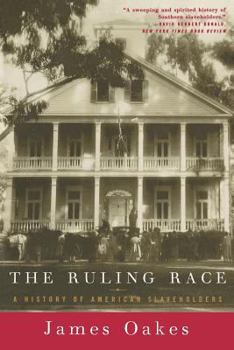Ruling Race: A History of American Slaveholders
Select Format
Select Condition 
Book Overview
This pathbreaking social history of the slaveholding South marks a turn in our understanding of antebellum America and the coming of the Civil War. Oakes's bracing analysis breaks the myth that slaveholders were a paternalistic aristocracy dedicated to the values of honor, race, and section. Instead they emerge as having much in common with their entrepreneurial counterparts in the North: they were committed to free-market commercialism and political...
Format:Paperback
Language:English
ISBN:0393317056
ISBN13:9780393317053
Release Date:January 1998
Publisher:W. W. Norton & Company
Length:334 Pages
Weight:0.80 lbs.
Dimensions:1.0" x 5.5" x 8.2"
Customer Reviews
2 ratings
Very, very interesting read
Published by Thriftbooks.com User , 19 years ago
I like to consider myself a student of 19th century American history, and especially of the South. But, I was not that knowledgable on the everyday lives of slaves or their masters. While there are several good works on the lives of slaves, I couldn't find a decent one on slaveholders until I picked this one up. Oakes has crafted an excellent look at what it was like, day to day, for the average slaveholder. Rather than looking at just the large plantation owners, he delves into the lives of slaveholders who owned 1 slave or 100. He focuses not on just one state, but several. The book was both well researched and well written. Most of the book reads very well because Oakes cites numerous diaries, letters, and newspapers. The book makes for quite a good read and will really add to your knowledge of slaveholders in the South.
Wonderful Study of the Plurality of Slaveholders
Published by Thriftbooks.com User , 24 years ago
James Oakes' The Ruling Class is a history of American slaveholders that effectively dispels the image of the paternalistic plantation aristocrat as the definitive, or even typical, portrait of the average slaveholder. It was interesting to see how much the Southeners and the Northeners had in common in political and ecomonic outlook. The average slaveholder was a grasping capitilist continually on the move and trying to advance himself. Slaves were a commodity to be used in this regard, as were the slaveholders' democratic politics and the expansion south and westward in the United States. The paternalist image built up in mythology after the Civil War existed but it was not representative. This book is effective is demonstrating the ways in which the slaves were an active, often rebellious, factor in this capititist drama as they also rejected any paternalist notion of their enslavement and saw the truth of the picture. They were a commodity both for labour and commerce. The book is excellant in portraying a complicated picture of the slaveholding class that involved many people of different ethnic, religious, political, and economic backgrounds all bound up in a capitilist explotiation of the slaves as a source of upward mobility in a very fluid society. A good place to begin to learn about this period of history.






